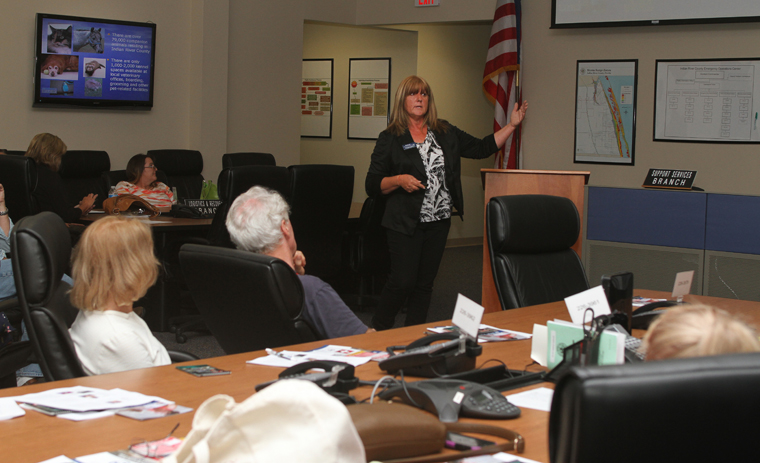
INDIAN RIVER COUNTY — More than 140,000 humans reside in Indian River County alongside 79,000 companion animals, according to the Humane Society of Vero Beach. In the case of a natural disaster or other emergency, people have the ability to prepare and plan. Pets on the other hand, have to rely on their human companions to prepare for them.
The Humane Society of Vero Beach and Indian River County partnered with SAFER Indian River County to bring Humane Emergency Animal Response Team (HEART) training to citizens of Indian River County who can be mobilized to help in an emergency situation.
Approximately 24 people attended Monday evening’s training session. Each of them had previously been certified as part of the Community Emergency Response Team program (CERT) or the Medical Reserve Corps.
“I’m here because we’ve learned how to take care of humans in an emergency; now I want to learn how to take care of the other part of the family, the pets,” said Patti Weiler, of Vero Beach.
Weiler was in attendance at Monday’s meeting with several friends who all graduated from the CERT program last October. Among her classmates was Joan Vodges, also of Vero Beach.
“Look at all of the dogs that were lost in Katrina,” Vodges said. “Some of them die just out of fright,” she added.
“They need to be with their companion,” Weiler said.
Weiler and Vodges were on point with the message delivered at the training session by Ilka Daniel, director of animal protective services at the Humane Society.
“People being separated from their pets creates a huge problem,” Daniel said. “Our goal is to keep them together.”
In her presentation, Daniel sited several examples in recent history of devastating natural disasters that left thousands of once cared for pets, lost and abandoned among the wreckage.
Going further, she shared instances of well meaning individuals and animal shelters collecting hundreds of strays without the ability to care for them, resulting in unhealthy living conditions and sometimes death for the animals.
In many of these cases, the animals that survive are never reunited with their owners.
The key, according to Daniel and other representatives at Monday’s meeting, is to prepare for the worst and include a pet plan in that preparation process.
“If you have a plan, it will work, but you need several plans,” Daniel said.
She specified that some disasters, such as a fire, could happen at a moment’s notice. Other disasters, such as a hurricane, necessitate several escape plans depending on the location, severity, and direction the hurricane is moving.
Daniel said that unprepared pet owners typically fall into one of two categories in the face of an emergency: they either stay home or have to leave their pets and cannot get back to them.
“We don’t want people staying home because they don’t have a plan for their pets,” Daniel said.
As part of the training, Daniel gave specific details of how to prepare for multiple emergencies. First of all, she said each pet owner should have kits prepared with ample food, water, toys, treats, a collar, leash, first aid kit, and vet records. Kits are recommended to keep in one or more places in a home as well as in a car.
Daniel also urged pet owners to educate themselves on the options available in case they have to evacuate their home. Pet owners should assess which family members and friends nearby would welcome pets, which hotels allow pets in emergencies, and what pet-friendly shelters are available.
She reminded those in attendance that pet friendly shelters and emergency boarding facilities should be used as a last resort for those who do not have the resources to seek refuge elsewhere.
Additionally, Daniel reiterated the importance of pre-registering with boarding facilities prior to emergencies in order to guarantee an open spot.
Though Monday’s session was geared toward small animals like cats, dogs, birds, “pocket pets,” and service animals, large animal training is already in the works.
The Humane Society has enlisted John Thompson to help with a future training course in handling larger animals like livestock and horses.
Thompson traveled to Louisiana and Mississippi with the Humane Society following Hurricane Katrina to assist with large and small animal rescues.
“Large animals, that’s a whole different world,” Daniel said.
Indian River County has approximately 200 citizens who are CERT trained and prepared to help in an emergency or disaster situation. After Monday, 24 of those citizens are equipped with the tools and information to lend a helping hand to the animals in the county as well.
Until the next emergency strikes, the newly HEART-certified citizens have been recruited to be community advocates spreading the word throughout the county that pets need a plan, too.
For more information on upcoming training sessions and how to prepare yourself and your pets for an emergency, contact Ilka Daniel at idaniel@hsvb.org, SAFER Indian River County, or the Indian River County Department of Emergency Services.



